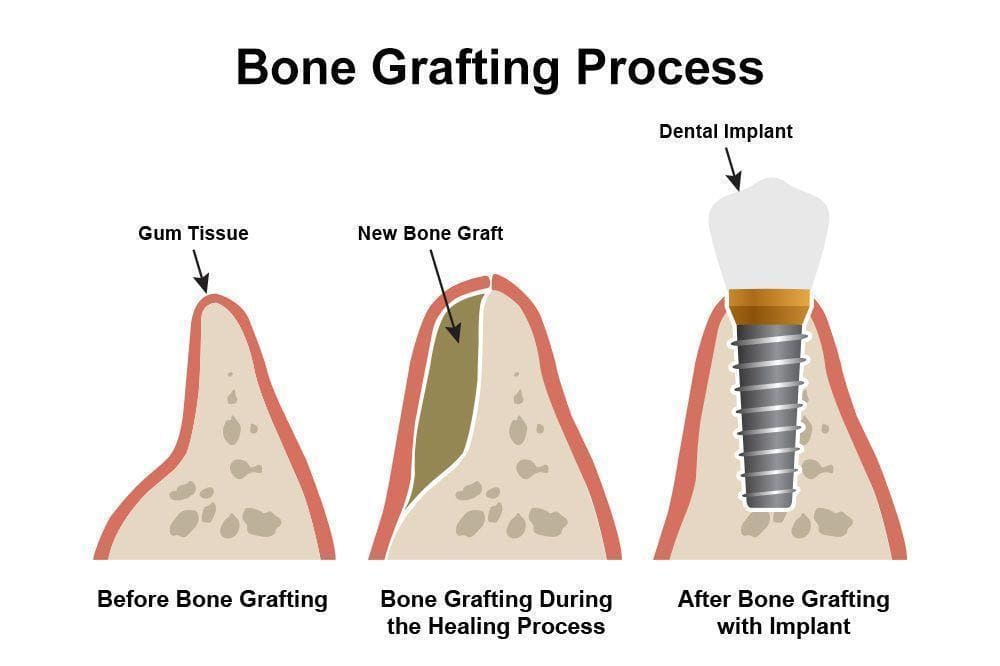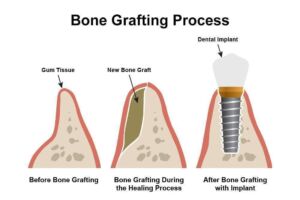Bone grafting is an integral part of dental restorative procedures. It often serves as a precursor to treatments such as dental implants. At Transcend Specialized Dentistry, our team of board-certified specialists is well-versed in conducting meticulous bone grafting procedures to ensure long-lasting results prior, during, or after dental implant surgeries.
What is Bone Grafting?
Bone grafting is a dental procedure aimed at restoring or enhancing your jawbone. When natural teeth are lost, the jawbone may deteriorate over time. A robust and healthy jawbone is a prerequisite for dental implants – artificial tooth roots that provide a strong foundation for replacement teeth. In these scenarios, bone grafting serves to rejuvenate the necessary foundation, paving the path for successful implant placement.
Why is Bone Grafting Necessary?
Dental implants, despite their realistic replacement for missing teeth, require a good amount of healthy bone for support. Factors like periodontal disease, tooth extractions, injuries, or dentures can lead to bone loss, complicating the implant placement. Bone grafting is the process used to regenerate the lost bone, ensuring stability and enhancing the results of dental implant surgery.
The Bone Grafting Process
The bone grafting procedure starts with a thorough evaluation of your oral health and the condition of your jawbone. At Transcend Specialized Dentistry, we leverage digital technology and 3D imaging such as cone-beam computed tomography (CBCT) to make this assessment and create a personalized treatment plan for optimal outcomes.
The process of bone grafting involves placing grafting material in the areas where bone loss has occurred. This material could be natural bone from another part of your jaw (autograft), bone from a human donor (allograft), animal-derived bone material (xenograft), or synthetic material (alloplast). Usually, we use bone that is readily available (allograft or xenograft), as it yields successful outcomes without necessitating a second surgical site.
In some cases, we also use Platelet-Rich Fibrin (PRF) or Platelet-Rich Plasma (PRP) to enhance the bone graft’s quality and promote tissue healing. These substances are derived from your own blood and can accelerate healing and bone growth.
The Role of Certified Specialists in Bone Grafting
Our team includes experienced prosthodontists and periodontists, all of whom are board-certified. The periodontist focuses on procedures like gum grafting and aesthetic gum lifts, along with bone grafting. Our dedicated team, with its specialized skills and expertise, works together to deliver an exceptional level of dental care.
The Path to Dental Implants Post Bone Grafting
Once the bone graft has healed, the stage is set for the placement of dental implants by our skilled specialists.
Key Aspects of dental grafting
What are the Potential Benefits of a Dental Bone Graft?
Bone grafting is crucial for patients who need a stronger foundation for dental implants. It helps restore the lost bone tissue, improves the stability of implants, and ensures that the jawbone remains healthy and functional.
How Successful are Dental Bone Grafts?
Bone grafting for dental implants generally has a high success rate, especially when performed by experienced bone grafting dentists. The success of the procedure is influenced by factors such as the patient’s overall health, the type of graft material used, and adherence to post-operative care instructions.
How Long Does it Take to Recover from a Dental Bone Graft?
Recovery from bone grafting varies depending on the extent of the procedure and the patient’s health. Typically, it takes 3 to 6 months for the grafted bone to fully integrate with the natural bone, during which time patients should follow their dentist’s instructions for optimal healing.
Frequently asked questions:
Who is a good candidate for bone grafting?
Good candidates for bone grafting are typically those who have good oral hygiene, do not smoke, and are generally healthy. Smoking and uncontrolled diabetes add additional risks for complications with surgical procedures. The final decision will be made by our team of specialists after a comprehensive examination and evaluation of your oral health.
What should I do to prepare for a bone grafting procedure?
Your preparation for a bone grafting procedure involves understanding the process, risks, and benefits. We will provide detailed pre-operative instructions, which may include guidelines on eating and drinking, managing your oral hygiene, and consulting with your physician regarding any medications you are currently taking if necessary.
Is the bone grafting procedure painful?
During the procedure, anesthesia is used to ensure you’re comfortable and pain-free. Post-procedure discomfort varies among patients but can typically be managed effectively with prescribed or over-the-counter pain medication.
Do I need to take time off work for a bone grafting procedure?
Not always, but this depends on the complexity of the procedure.We may recommend taking a few days off work following the procedure to rest and recuperate, however this is not always necessary. The exact duration may vary depending on your specific circumstances and the complexity of your procedure.
How much does a bone grafting procedure cost?
The cost of a bone grafting procedure can vary based on several factors, including the type of graft used, the complexity of the case, and the specific needs of the patient. It’s best to discuss this with our team during your consultation for a more accurate estimate. This can range from $1200-$3500.
What are the risks associated with bone grafting?
As with any surgical procedure, bone grafting carries some risks, including infection, minor bleeding, or discomfort. However, these risks are minimal, and we take precautions to minimize the occurrence of these complications. We will discuss all potential risks with you during your consultation.
How long does it take for a bone graft to heal?
Healing times can vary greatly depending on the individual patient and the specifics of the procedure, but it typically takes 3-6 months for the grafted bone to fully integrate with your natural bone.
Will I be able to eat normally after the procedure?
Initially, you will need to adhere to a soft food diet to avoid disturbing the graft site. As healing progresses, you will be able to gradually reintroduce harder foods into your diet.
How successful are bone grafting procedures?
Bone grafting procedures have a high success rate, especially when performed by experienced specialists. The success of the procedure also depends on following post-operative care instructions and maintaining good oral hygiene.
Will I need a bone graft if I want dental implants?
Not all patients who want dental implants will need a bone graft. A bone graft is typically required when the jawbone has receded or isn’t thick enough to support implants. This will be assessed during your consultation with our 3D imaging (CBCT) to determine whether or not grafting is required prior or during implant placement.
Can dental implant and bone graft be done at the same time?
Yes, in some cases, bone grafting for dental implants can be done at the same time as the implant placement. This is known as “simultaneous grafting” and is ideal for patients with minimal bone loss.
How successful is bone grafting for dental implants?
The success of bone grafting for dental implants depends on factors like the patient’s bone health, the type of graft used, and the experience of the bone grafting dentist. Generally, the procedure is highly successful.
What is the timeline for dental implants with bone graft?
The timeline for dental implants with bone grafting typically ranges from 4 to 9 months, depending on the healing process of the bone graft and the patient’s individual recovery rate.
What happens if I get a bone graft but no implant?
If you receive a bone graft and implant, the graft will help regenerate the bone necessary for implant placement. However, if no implant is placed after the graft, the bone will still provide a stronger foundation for future dental work, though it may not be as functionally effective without the implant.
Dental Bone Graft Specialist at Transcend Dentistry
At Transcend Dentistry, our team of highly skilled dental bone graft specialists is dedicated to restoring your jawbone health and preparing your mouth for dental implants.
Led by experienced periodontists, we offer a comprehensive range of bone grafting procedures tailored to your unique needs. Using advanced techniques and technology, our specialists ensure the highest standards of care.
In Conclusion
At Transcend Specialized Dentistry, we prioritize patient education and comfort. We ensure our patients understand their treatment options and feel confident in their dental care decisions. Bone grafting, a procedure that demands expertise, skill, and experience, is carried out with utmost professionalism at our clinic. If you’re considering bone grafting or dental implants, trust the board-certified specialists and their team at Transcend Specialized Dentistry to guide you every step of the way towards achieving a beautiful, healthy smile.
Note: It’s crucial to consult with a dental professional before making decisions about any form of dental treatment. The information provided in this blog is intended to educate and should not replace professional medical advice.
Read More:
The Gum Grafting Procedure


